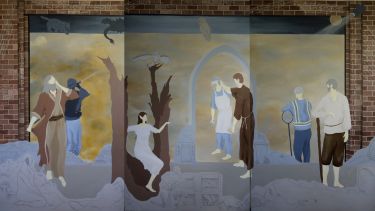Love and Intoxication in a Renaissance Pleasure Palace
This evocatively titled event, staged in the Spiegeltent in Sheffield city centre as part of the 2022 Festival of the Mind, presented work in progress from a collaborative research project investigating the history of Bolsover Castle as a site for entertainment and celebration. For this project, Professor Frances Babbage (Theatre Studies, School of English) joined a team led by Professor Phil Withington and Dr Crosby Stevens (Department of History), together with theatre architect Nick Helm, Renaissance Literature specialist Professor Martin Butler (University of Leeds) and theatre director David Thacker (former Artistic Director of the Bolton Octagon) with the aim of understanding the complex meanings embedded in the architecture of Bolsover and its status as a Renaissance ‘pleasure palace’. Central to the investigation was Dr Stevens’ hypothesis that Ben Jonson’s play The New Inn was written for private performance at Bolsover, for the family of Jonson’s patron William Cavendish, in addition to its public performance by the King’s Men, in London. This proposition is underpinned by numerous references in Jonson’s play to images and themes that correspond strikingly to the paintings, murals and architecture of the house. The event in the Spiegeltent shared findings from creative research workshops conducted at Bolsover earlier in 2022, before presenting a rehearsed reading of The New Inn, abridged, with the help of professional actors Harry Long, Margot Leicester, Fiona Hampton, Anna Wheatley and John Branwell.
The video below contains more information about the architectural and art history research behind the project.
In addition to support received from English Heritage, ‘Love and Intoxication…’ was funded by HERA as part of a larger research project titled Intoxicating Spaces: the impact of new intoxicants on urban spaces in Europe 1600-1850, led by Professor Withington. More information can be found on the Intoxicating Spaces website.
A Mirror of the Invisible
Dr Tom Rutter’s collaborative project, ‘A Mirror of the Invisible’, featured in this year’s Festival of the Mind in September. It involved the creation by artist Gina Allen of a piece based on Tom’s ongoing research into the science of Shakespeare’s age. The artwork took the form of a three-panel painting that used the theme of the mirror (a common motif in the titles of early scientific texts) to put early modern ideas about science into dialogue with today’s priorities and concerns, in particular the climate emergency, plastics pollution and the Covid pandemic. Characters from Shakespeare plays, including King Lear, Friar John (Romeo and Juliet) and Prospero are mirrored in figures who are at the forefront of efforts to deal with twenty-first-century crises, while other details of the image refer to early modern and contemporary beliefs about weather and climate, pollution and disease.
More information about the project, as well as a podcast episode featuring a discussion between Dr Tom Rutter and Gina Allen, can be found on the project's Festival of the Mind page.
A full list of all of the projects from staff across the university as a whole can be found on the Festival of the Mind 2022 website.
Other projects from School of English staff included:
- Professor David Forrest: Battledress
- Professor Jo Gavins & Dr Seth Mehl: Yes, it's Plastic, but...
- Dr Chris Montgomery: The Reaction-ator: Exploring Real-time Responses to Speech




